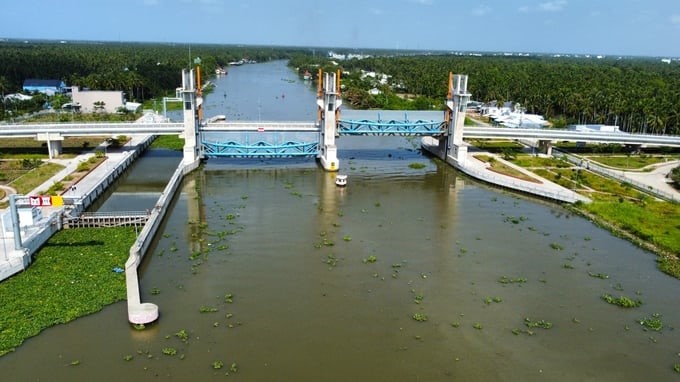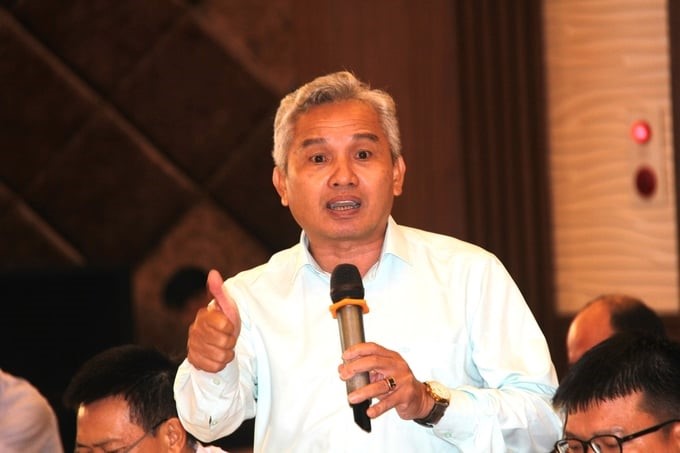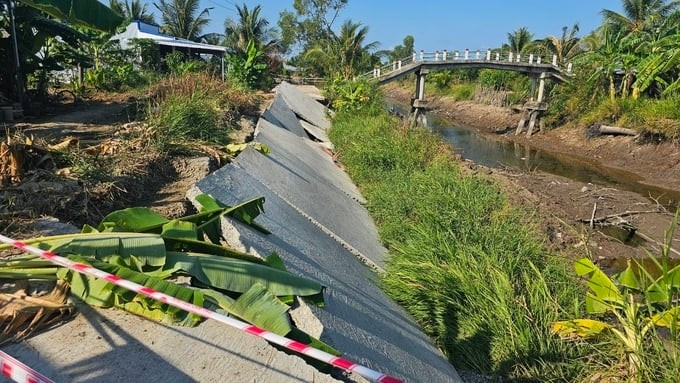June 20, 2025 | 08:46 GMT +7
June 20, 2025 | 08:46 GMT +7
Hotline: 0913.378.918
June 20, 2025 | 08:46 GMT +7
Hotline: 0913.378.918
In recent times, there have been many discussions surrounding the issue of investment in irrigation structures to control salinity and freshness in the Mekong Delta. Although there are many conflicting opinions, they generally aim for stable and sustainable development for people in the Mekong Delta.
And of course, it is undeniable that in the first months of the 2023–2024 dry season, with the severe developments of drought and salinity, the invested irrigation structures were showing clear effectiveness in controlling salinity, freshness, and ensuring safety for production areas.

In the midst of drought and salinity in 2024, irrigation structures were showing clear effectiveness in ensuring the safety of agricultural production areas in Mekong Delta localities. Photo: Kim Anh.
However, in order to manage as well as have strict and appropriate operating mechanisms for irrigation structures, economic expert Tran Huu Hiep shared his views on investment solutions according to the principle of "no regrets".
This principle is explained by Mr. Hiep as follows: with rapid changes from natural conditions to the rapid development of science and technology and market fluctuations, many problems will gradually become outdated.
Therefore, all construction investment structures, including irrigation structures, must be carefully considered to not only meet current needs but also look to future development trends.
In recent years, environmentalists around the world, especially domestic and foreign experts participating in consultations for the Mekong Delta Regional Planning, have often mentioned the principle of "no regrets" or "least regrets" when investing in irrigation structures in the delta. Mr. Hiep said that this principle needs to be understood as a way to manage risk.
"For the things we are not sure about, we need to have solutions with the least risk. Thus, when deciding to invest in large, rapidly changing structures, it is compulsory to consider them extremely carefully and approach them from many different angles," expert Tran Huu Hiep analyzed.

Economic expert Tran Huu Hiep shared about the principle of "no regrets" when investing in irrigation structures in the Mekong Delta region. Photo: Kim Anh.
Faced with many experts' opinions that the current solutions to control salinity and freshness are not reasonable and need to be changed, Mr. Hiep said that irrigation, in addition to bringing benefits to water resources, will be accompanied by a "water damage" factor.
It means that if the investment process goes against natural laws or changes natural conditions and development needs, the structure’s effectiveness will become the opposite. Therefore, conflicting opinions about investment in some irrigation structures need to be recorded and carefully evaluated.
According to Mr. Hiep, previously, investment in irrigation structures aimed to serve the big goal of preventing salinity and preserving freshness. Typical are some investment projects in freshwater regions such as the Ca Mau Peninsula and Go Cong district (Tien Giang province). This is not wrong with the development requirements at that time, when localities in the Mekong Delta aimed for a national food and export program.
However, up to now, the natural and socio-economic development has changed. The structure of agricultural development in the Mekong Delta has been shifted from rice, fruit, and seafood to seafood, fruit, and rice.
Especially since the Mekong Delta Regional Planning and the Planning of 13 Provinces and Cities were approved by the Prime Minister, three areas of fresh water, brackish water, and salt water have been clearly formed. Corresponding to the regions are different development scenarios. In addition to growing rice, localities all prioritize developing fruit trees and taking advantage of water resources for aquaculture.

Subsidence and landslides have affected and divided a number of roads in the U Minh Thuong buffer zone, Kien Giang province, during the dry season of 2023–2024. Photo: Kim Anh.
Reality proves that, during the dry season of 2023–2024, subsidence of traffic routes has occurred in freshwater areas. Therefore, Mr. Hiep expressed his opinion that it is necessary to consider and review the issue of freshening for irrigation structures.
Mr. Hiep emphasized that investment in irrigation is necessary, but there must be close coordination between localities. Not only looking at the perspective of a province or city but also respecting the operating laws of nature and the development requirements of the entire Mekong Delta region. Only in this way can we meet development requirements in the coming time.
Translated by Thu Huyen
/2025/06/17/3942-2-143243_548.jpg)
(VAN) Recently, in Sweden, the Secretary of the Binh Dinh Provincial Party Committee presented the Investment Registration Certificate for the 'Polyester Fabric Recycling Complex' project to SYRE Impact-AB Company.
/2025/06/12/3721-2-202745_83.jpg)
(VAN) TH made an impression at Seoul Food 2025 with its line of natural beverages, paving the way for Vietnamese food products to enter the South Korean market.

(VAN) Soc Trang's success in rice exports stems from a strategy of developing fragrant and specialty rice cultivation areas and standardizing production toward low-emission practices.
/2025/06/11/1311-5-120811_839.jpg)
(VAN) The pig farming industry is facing the challenge of comprehensive restructuring to meet requirements for quality, safety, traceability, and market expansion both domestically and for export.

(VAN) Vietnam considers participating in ALGROALBA in order to expand agricultural production, coordinate the assessment and effective exploitation potential land.
/2025/06/05/5314-1-184727_407.jpg)
(VAN) From seemingly worthless fish scales and skin, enzymes and lactic ferments can transform by-products into peptides, opening a sustainable, effective business direction and elevating Vietnamese seafood.

(VAN) TTC AgriS and IFC signed a strategic partnership to develop a sustainable agricultural value chain, aiming to achieve the Net Zero target by 2035.